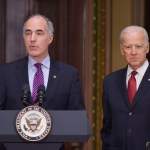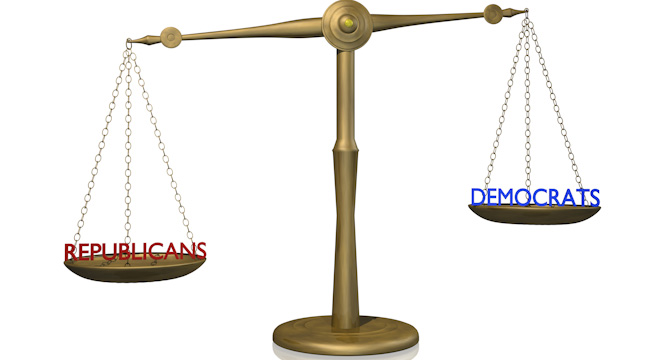As we head into the start of 2012, most of the public attention is on the presidential campaign and the Republican primary race. But another major battle is brewing: That for control of the U.S. Senate.
Speaking to both Democratic and Republican sources, it is clear that nobody is taking majority or minority status for granted — the chamber is up for grabs, and everyone is working hard for it.
A national Republican source told TPM: “While the map does favor Republicans, nobody on the Republican side is beating their chest or taking anything for granted.”
A Democratic source also sounded a note of cautious optimism: “I think the cycle has changed dramatically. At the beginning of the cycle everything was 23 [Democratic] seats, vs. 10 seats that have to be defended for them. Now as you’re seeing things develop, things are looking a lot better.”
The bottom line: The Dems who are currently the most at risk are Sens. Ben Nelson (NE), Claire McCaskill (MO), and Jon Tester (MT), plus the open seat of retiring Dem Sen. Kent Conrad (ND). (In North Dakota, Dems were lifted recently by the recruitment of former state Attorney General Heidi Heitkamp, and the Dems have released polling with Heitkamp ahead of the presumptive Republican nominee, Rick Berg. However, the state is also likely to vote Republican for president by a wide margin, so the Dems would need plenty of ticket-splitting.)
On the flip side, the most endangered Republicans are Scott Brown in deep-blue Massachusetts, and Nevada’s Dean Heller, who was appointed to the Senate after resignation of scandal-plagued Sen. John Ensign.
There are also three retiring Democratic senators in some swing states, whose seats will be hotly contested all the way through: Jim Webb’s seat in Virginia — where there has already been a heated, general election-style debate — plus Jeff Bingaman’s seat in New Mexico, and Herb Kohl’s seat in Wisconsin.
On paper, the layout of the seats themselves would make it look like the Dems have to play some serious offense. The last election cycle for this particular third of the Senate was in the Democratic wave year of 2006. The Dems won 24 out of the 33 seats that were up, compared to only nine won by the Republicans. Since then, the numbers on this Senate class shifted from 24-9 to 23-10, after Scott Brown’s victory in the January 2010 special election in Massachusetts.
(For the purposes of this discussion, independent Sens. Joe Lieberman and Bernie Sanders are being counted as if they were full-fledged Democrats, due to their caucus votes.)
As such, as we head into the cycle with a 53-47 Dem Senate, the Republicans have 37 seats that will not be on the ballot, compared to only 30 seats for the Dems. As such, the Dems will have to win a big majority out of these contests –Â just to stay in the same place.
Of course, not all seats are created equally. Among the Democratic seats are some likely secure holds for incumbents, such as Rhode Island, Vermont, New York, New Jersey, Delaware, Maryland, Minnesota, and California. Also, the open seat of Joe Lieberman in Connecticut is more likely than not to stay in the Democratic column, though Republicans will be contesting it. On the other side of the ledger, Republican incumbents are also very safe in Maine, Mississippi, Tennessee, Utah and Wyoming, plus the open seat of Sen. Kay Bailey Hutchison in Republican-friendly Texas. Thus, the makeup of the seats does close the gap for the Dems, bringing them closer to the majority — but only partially.
Republicans are also eyeing a few other incumbent Dems. Sen. Sherrod Brown (OH) is being opposed by state Treasurer Josh Mandel. Sen. Bill Nelson (FL) and Sen. Bob Casey (PA) could have close races in their swing states, but the Republican fields are still shaking out in very wide-open primaries. (However, recent polling has shown Brown, Casey and Nelson all very well ahead of their opponents. Then again, the election is almost a year away, and a lot can certainly happen.)
Meanwhile, Democrats hope to expand the field in some other states, such as the open GOP-held seat of Arizona. Republican Rep. Jeff Flake will face the winner of the Democratic primary, either the national Dems’ choice of former Bush-era Surgeon General Richard Carmona, or former state Democratic Party chairman Don Bivens.
In addition, both parties are eyeing some outside shots. For the Republicans, it is heavily Democratic Hawaii, where Democratic Sen. Daniel Akaka is retiring. On the one hand, President Obama carried this state by a whopping 72%-27% in 2008. On the other, the GOP has also recruited their strongest possible candidate, in former two-term Gov. Linda Lingle.
Meanwhile, the Dems are also looking at Indiana, where GOP Sen. Richard Lugar has seemingly been safe and secure since he was first elected way back in 1976. This cycle, Lugar has two opponents: Three-term Democratic Rep. Joe Donnelly is running in the general election — and before that, state Treasurer Richard Mourdock is challenging Lugar from the right in the Republican primary. Dems will say that they have a chance either way, and Republicans likewise say that they will hold the seat either way. From a conservative analytical standpoint, keep a very close eye on the Republican primary in May — if Mourdock wins, that seat could potentially go into the Toss-Up column, if only due to the sudden variable.
Of course, as noted in the introduction, these races will be going on at the same time as the presidential race — a factor that is not to be minimized at all.
Our Republican source said: “One of the challenges for the Democrats, when you look at the map, President Obama and his billion-dollar war chest or whatever it is, he will not be spending money in North Dakota, Montana, Nebraska, or Indiana. In those four states the president is deeply unpopular, and whoever our nominee is, the Democratic nominee [for Senate] is going to be tied to the president’s hips. And that’s going to be a deep challenge for them.”
Meanwhile, the Democratic source told TPM that if Mitt Romney is the Republican nominee, Democrats will be prepared to tag him as a flip-flopper, and to go after him for the various right-wing positions he would have had to take in order to win the primaries, such as his endorsement of the Paul Ryan Medicare privatization plan. And if the GOP nominee is Newt Gingrich, the source said: “Newt Gingrich could go down as the greatest thing to happen to Democrats since George W. Bush. In a general election he’d be flat-out toxic.”









